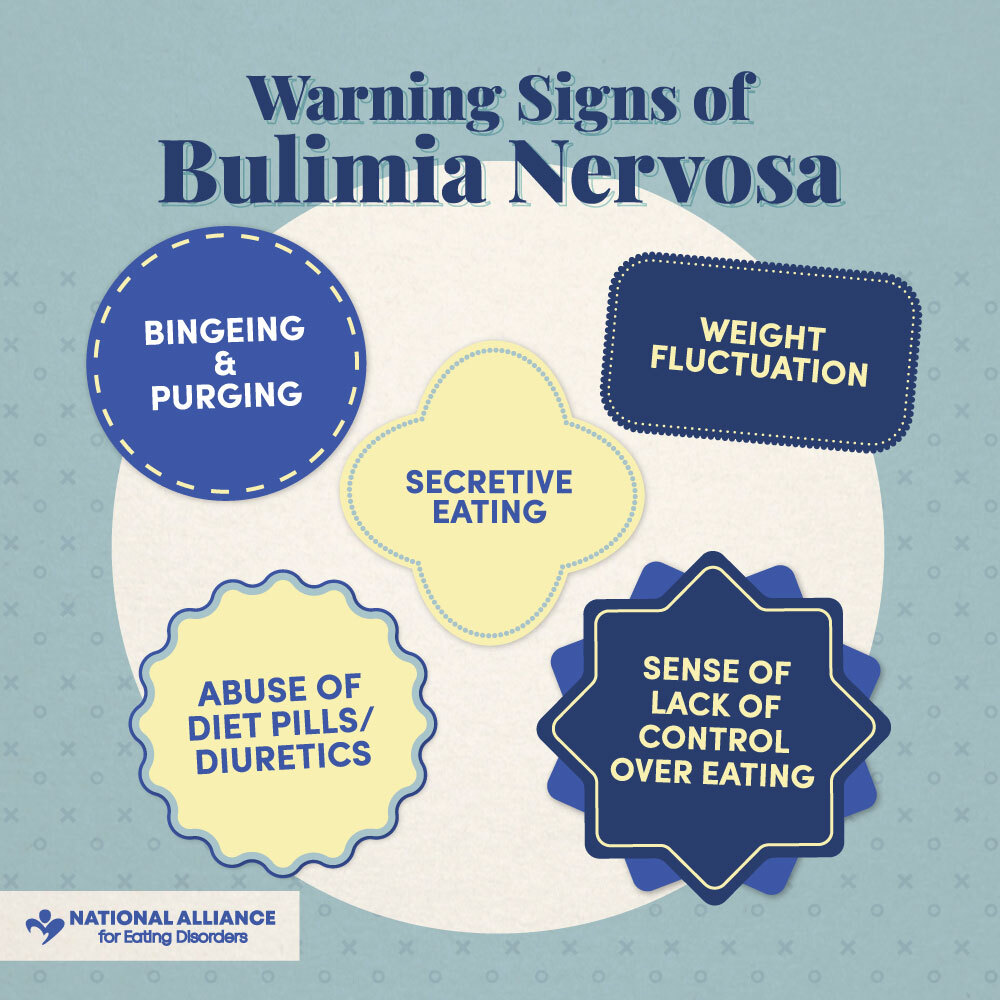What Is Bulimia Nervosa?
Bulimia Nervosa is an eating disorder where someone has regular episodes of binge eating (consuming a large amount of food in a short period of time) followed by purging (getting rid of calories). These cycles usually occur at least once a week for three months or more. If you are struggling with Bulimia Nervosa, you may purge via one or several of the following methods: self-induced vomiting, compulsive exercise, laxative use, diuretic use, insulin misuse, and/or diet pill use.
It is common for those experiencing Bulimia Nervosa to have a negative body image related to their body’s size, weight, or shape. Many individuals who experience Bulimia Nervosa may also struggle with other conditions such as self-injury, substance abuse, and impulsivity.
If you are struggling with Bulimia Nervosa it is important to know that you are not alone. The Alliance is here to support you. Our team of experienced clinicians is uniquely trained to seek out and connect you with the necessary resources. Connect with us at findEDhelp.com to find eating disorder treatment options near you today, or continue reading to discover more about Bulimia Nervosa.

Signs & Symptoms of Bulimia Nervosa
Bulimia Nervosa is an eating disorder that may be life-threatening without professional intervention and treatment. Recognizing the signs of someone struggling with Bulimia Nervosa is extremely important in mitigating health risks. However, because of the secretive nature of the disorder, this can prove to be difficult. Therefore, it’s important to understand all of the warning signs and symptoms associated with Bulimia Nervosa. While it is not a comprehensive list, the following symptoms are some of the most common among those struggling with Bulimia Nervosa:
- Bingeing and purging
- Lack of control over eating
- Secretive eating and/or missing food
- Visits to the bathroom after meals
- Preoccupation with food
- Weight fluctuations
- Self-injury
- Excessive and compulsive exercise regimes
- Abuse of laxatives, diet pills and/or diuretics
- Swollen parotid glands in cheeks and neck
- Discoloration and/or staining of the teeth
- Broken blood vessels in eyes and/or face
- Calluses on the back of the hands/knuckles
- Sore throat
- Heartburn/acid reflux
- Self-criticism and feelings of shame and guilt
- High levels of anxiety and/or depression
If you or a loved one is experiencing any of the above symptoms, we recommend seeking treatment from a specialized professional. The Alliance is here to help. Visit our national, interactive database to find eating disorder treatment options near you today or call our therapist-staffed helpline at 866-662-1235. For a complete guide to DSM-5 Diagnosis Criteria for Bulimia Nervosa, visit the NCBI website.
Dangers & Side Effects of Bulimia Nervosa
Bulimia Nervosa can cause a number of serious health complications. The cycle of bingeing and purging can cause damage to everything from your teeth and esophagus to your heart and liver. That’s why early intervention is extremely important. The following are just some of the dangers of Bulimia Nervosa:
- Fatigue and lack of energy
- Anemia (iron deficiency)
- Irregular menstruation or Amenorrhea
- Low blood pressure
- Dizziness
- Edema (swelling of hands and feet)
- Dehydration
- Gastric rupture
- Inflammation and possible rupture of the esophagus
- Development of peptic ulcers
- Pancreatitis (inflammation of the pancreas)
- Stomach pain and bloating
- Constipation and diarrhea
- Cathartic colon (caused from laxative abuse)
- Hemorrhoids
- Tooth decay/gum disease
- Kidney and liver damage
- Electrolyte imbalances that can lead to irregular heartbeat and seizures
- Cardiac arrest
Bulimia Nervosa can be a fatal disorder. It is extremely important to seek treatment if you or a loved one is experiencing any of the above side effects. The Alliance is here to help. Connect with us at findEDhelp.com or call our therapist-staffed helpline (866.662.1235) to find eating disorder treatment options near you today.
Bulimia Nervosa Diagnosis & Treatment
If you or a loved one is struggling with Bulimia Nervosa, you do not have to go through this alone. The Alliance is here to help. Visit our national, interactive database to find eating disorder treatment options near you today or call our therapist-staffed helpline at 866-662-1235. Learn more about members of an eating disorder treatment team here, and discover recovery programs, services and support groups with The Alliance here. Help is available and recovery is possible.
Bulimia Nervosa and Loved Ones
If someone you love is struggling with Bulimia Nervosa, it can be a scary and difficult time for everyone involved. If your loved one is displaying any of the signs and symptoms mentioned above, it’s important to seek help. Early intervention greatly increases the likelihood of recovery. It is also important that you, the family and friends of someone experiencing an eating disorder, get help and support for yourselves. Please consider attending family therapy and/or a family and friends support group. The Alliance is here to support you, too. Visit our page for loved ones to find out more about helping a loved one through an eating disorder, or sign up for our virtual friends and family support group here.
Featured Posts
September 04, 2024
The Link Between Eating Disorders and Substance Use
READ MORE
July 03, 2024
Rethinking Exercise: Joyful Movement Is Possible in Eating Disorder Recovery
READ MORE
Find Treatment Today
Recovery is possible, and we are here to help connect you with the resources to get there.
